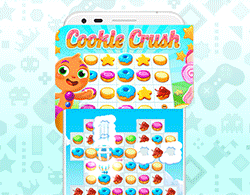· 8 min read
Winning Big With Facebook Messenger Games – SOFTGAMES Interview

Sarah Impey
Content Creator at GameAnalytics
Being one of the five biggest developers on Facebook Messenger, I spoke with Alexander Krug, CEO of SOFTGAMES, to learn about the history of the studio, and how they use analytics to monitor their successful portfolio of HTML5 messenger games.
SOFTGAMES is the world’s largest HTML5 games platform with a pretty awesome vision. Can you give us some background into how it all started?
Our journey began in 2006 as a four-person startup in Berlin. At that time, we exclusively developed J2ME Games for all major German television channels such as ProSieben, Sat.1 or RTL, and built titles for TV shows like “Germany’s Next Top Model” or “Formula 1”.
The market witnessed a drastic change with the release of the iPhone 3G in 2008. After Steve Job’s open letter “Thoughts on Flash” in 2010 announcing that Flash won’t be allowed to run on iOS platforms, we decided to pioneer in the field of HTML5 games.

Our mission was simple: help Flash game portals offer their customers engaging and high-quality cross-platform content built in HTML5. Since then, we developed over 500 titles, and built the world’s largest distribution and monetization platform for HTML5 games outside the messengers, with an impressive reach of 30 million MAU.
Then the next big change came. We were invited by Facebook to become one of 15 exclusive launch partners for Facebook’s Instant Games in November 2016. Today, we are one of the five biggest developers on the platform, which is pretty amazing. We’re the developers behind hits like Cookie Crush, Solitaire Story and Bubble Shooter. I’m very proud of our fantastic team who have done an excellent job getting us there!
So SOFTGAMES has been on quite a journey! When Facebook reached out and asked you to be one of their partners, how did this affect SOFTGAMES?
We were all very excited, and immediately understood that this was a once in a lifetime opportunity. This was our chance to explore a new platform and allow us to do our bit in shaping the future of chat app gaming for more than 1 billion potential players. Extending our activities to Facebook was an opportunity we couldn’t miss.
To meet this challenge, we built on our long-term experience with HTML5 casual games and our in-depth analysis of the unique platform features and possibilities. We had to think about our potential players: How do they use messenger platforms, and what kind of games would they like to play on these?
The second step was to define how we can integrate a game in a fun and engaging way that enhances the users overall messenger experience. After some careful consideration, we decided to bring our most successful titles (such as Cookie Crush or Solitaire Story) to Instant Games and started exploring the platform from there.

Building on what we’d learnt from that process so far, we shifted our focus towards community orientated game development. Since we are developing our upcoming titles exclusively for Messengers, we tailor them even closer to the platform’s features, possibilities and future development.
We want to create high quality social gaming experiences for our players, which they can enjoy together with friends and family. Subsequently, putting more focus on game development rather than publishing affected the structure of our team, of course.
Were the results from the partnership immediately noticeable, or would you say it was a gradual growth?
Partnering with Facebook has definitely been a success story for us. Since the launch of Instant Games, we’ve already entertained more than 60MM unique users on the platform and rising. With Messenger Games getting more attention, this development constantly accelerates.
With HTML5 gaming now bigger than ever, and Facebook rolling out both more features and additional options for monetization, we expect to double our revenues for 2018. Thanks to our ongoing success, we’re aiming to increase our staff significantly by the end of the year, which is really fantastic.
And were there any challenges that came with this new growth? How did you overcome them?
With around 70 titles on the platform published under the ROFL and SOFTGAMES brand by now, we have to keep track of their performance and make sure that they all work properly.
GameAnalytics proved to be extremely useful in that regard, helping us to continuously optimize several hit titles across multiple platforms by allowing for higher level KPI monitoring.
It’s great to hear that GameAnalytics has made such a difference! I know that a lot of our readers would be interested in finding out exactly how you used analytics to do this. Can you share with us what kind of metrics you were tracking and why?
We focus on metrics such as our level progression, monetization performance, and churn. For that purpose, we create custom dashboards to track and optimize core KPIs. We also pay particular attention to on-boarding funnels to identify significant drops in engagement, identify what’s the problem, and then resolve that. Using these insights, we could double day one retention.
Building on all these learnings, combined with what we’ve learned from closely listening to player feedback, we regularly introduce game features to grow our audience and retain engagement of our returning users.
You’ve had a string of hit titles since the partnership with Facebook. What would you say are the qualities that SOFTGAMES looks out for when taking on a new game?
It is essential to take into account how the messenger platform is integrated in people’s daily lives – how they use it and for what purposes. The primary reason for using a messenger is connecting and communicating with people. Games can be the perfect vehicle for this, making interactions more fun, filling idle times together, or saying playfully “hi” to a remote friend.
We want users to get the full social gaming experience that Instant Games enables by design. Therefore we develop and optimize our games exactly for the purpose of connecting people.
What are the steps that you take to monetize your titles? Do you have any tips or recommendations to any developers?
We have been monetizing our games through Rewarded and Interstitial Ads, plus optimizing content with in-game economy using In-App Purchases. One cornerstone for our ongoing success is the high quality of our games. These are tailored precisely to the platforms features and affordances in order to retain engagement.
We closely listen to our player’s feedback and constantly optimize the games, especially regarding a well-balanced player progression. We make sure to keep them fresh with fun and interesting challenges.
Messenger games has seen more and more interest over the past few years. How do you see this developing in the future?
At this year’s Facebook Gaming Marketing Summit in London, Newzoo’s CEO, Peter Warman, predicted that creating games for messengers would be the most future-proof source of income for developers. He noted that app stores are likely to disappear by 2050 because users are moving to new platforms such as messengers. We agree closely to this statement, having already said something similar in one of our talks given at Casual Connect Europe in early 2017.

We already see messaging apps with enormous user bases. People are quickly adopting new services provided, such as calling a cab, ordering a pizza or playing games.
The big advantage of messenger games is that unlike Apps, the gaming experience doesn’t interrupt, but seamlessly integrates into the overall messenger experience. This is the most important shift in distribution models in recent times. We are still at the starting line, but the potential is definitely huge, both in terms of growth and creative inventions.
Speaking of the future, what is the next big focus for SOFTGAMES?
Right now, there is still a lot to discover in the field of messenger games. There are no established standards that everyone is following so far, and there is much room for creative experiments which gives us the opportunity to make a difference towards competition.
The platform itself is still taking shape as Facebook continues launching new features. We’re constantly experimenting and seeing how these can be integrated in our games to improve player experience. Very exciting times!
Lastly, as the largest HTML5 platform with a ton of experience, what advice would you give to an indie developer looking to break into the gaming industry?
Most importantly: do your research. Explore the platform you want to create your game for, take a look at the current market situation, and what kind of games are successful and why.
When it comes to Instant Games, Facebook gives some basic recommendations every developer should take heed of before starting to create a game for the platform. Top ones include aiming for short loading times, making your game quickly accessible by offering short tutorials (if it isn’t self-explaining), encouraging social play by offering meaningful interactions and keep optimizing for mobile devices – a large majority of players will access the game from there.
One of our key learnings that I already mentioned above is: listen to your players and keep optimizing. Besides building the game itself on the social aspect, it is important to engage the community by actively talking to them, not just about company update, but also about the game. Collect their feedback and react!
This is a unique and excellent feature messenger apps provide you with: the direct contact with your players.
To learn more about how SOFTGAMES uses the GameAnalytics tool to win big, you can check out our Case Study with them here.